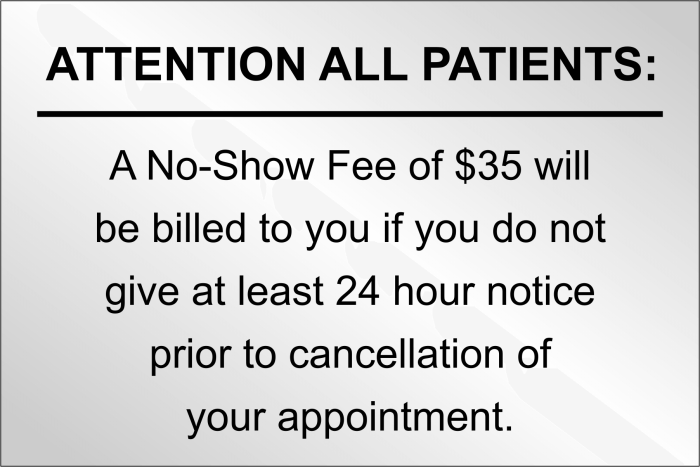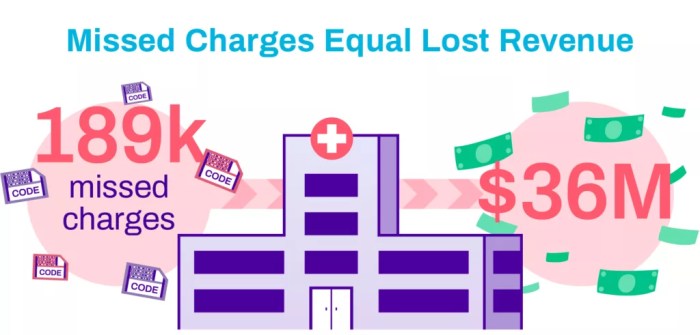Charge capture relates to charges for missed appointments. – Charge capture relates to charges for missed appointments, presenting unique implications for healthcare providers and patients. Understanding the concept, methods, and ethical considerations surrounding charge capture is crucial for effective revenue cycle management.
Missed appointments result in lost revenue for healthcare providers and can strain patient-provider relationships. This introductory paragraph sets the stage for a comprehensive exploration of charge capture in the context of missed appointments.
Charge Capture
Charge capture is the process of recording and documenting charges for healthcare services provided to patients. It is a critical component of the revenue cycle management process in healthcare organizations, ensuring that providers receive appropriate reimbursement for the services they deliver.
Typical charges captured in healthcare settings include:
- Professional fees for physician services
- Facility fees for use of hospital or clinic facilities
- Equipment and supply charges
- Laboratory and diagnostic test charges
- Medication charges
Charge Capture for Missed Appointments

Missed appointments represent a significant financial loss for healthcare providers, as they result in unutilized time and resources. Charge capture for missed appointments is the process of billing patients for the time and resources allocated for the missed appointment.
The financial impact of missed appointments can be substantial. According to the Medical Group Management Association (MGMA), missed appointments cost healthcare providers an estimated $150 billion annually in the United States alone.
Methods for Charge Capture, Charge capture relates to charges for missed appointments.
There are various methods used for charge capture in healthcare organizations, including:
- Manual charge capture:This involves manually recording charges in a paper-based or electronic system.
- Automated charge capture:This uses technology to automatically capture charges based on predefined rules and algorithms.
- Hybrid charge capture:This combines manual and automated methods to capture charges.
Each method has its own advantages and disadvantages. Manual charge capture is relatively inexpensive and easy to implement, but it can be prone to errors and inconsistencies. Automated charge capture is more efficient and accurate, but it requires a significant investment in technology and infrastructure.
Challenges in Charge Capture for Missed Appointments

Charge capture for missed appointments can be challenging due to several factors, including:
- Lack of standardization:There is no standardized approach to charge capture for missed appointments, which can lead to inconsistencies in billing practices.
- Patient resistance:Patients may be resistant to paying for missed appointments, particularly if they have a legitimate reason for missing the appointment.
- Legal and ethical concerns:Healthcare providers must ensure that their charge capture practices comply with applicable laws and ethical guidelines.
Regulatory Considerations

Charge capture for missed appointments is subject to various regulations and guidelines, including:
- Medicare and Medicaid regulations:These regulations establish specific requirements for charge capture for missed appointments, including the conditions under which charges can be billed.
- Private payer policies:Private payers may have their own policies and procedures regarding charge capture for missed appointments.
- State laws:Some states have laws that regulate charge capture for missed appointments.
Ethical Considerations

Charge capture for missed appointments raises several ethical considerations, including:
- Patient access to care:Healthcare providers must balance the need to recoup lost revenue with the importance of maintaining patient access to care.
- Patient relationships:Charging patients for missed appointments can damage patient relationships and discourage them from seeking care in the future.
- Equity and fairness:Healthcare providers must ensure that their charge capture practices are fair and equitable to all patients, regardless of their ability to pay.
Helpful Answers: Charge Capture Relates To Charges For Missed Appointments.
What are the common methods used for charge capture?
Charge capture methods include manual entry, electronic health records (EHRs), and automated systems.
What are the challenges associated with charge capture for missed appointments?
Challenges include identifying missed appointments, determining appropriate charges, and handling patient disputes.
What ethical considerations should be taken into account when charging for missed appointments?
Ethical considerations involve balancing revenue generation with patient relationships, ensuring transparency, and avoiding excessive charges.